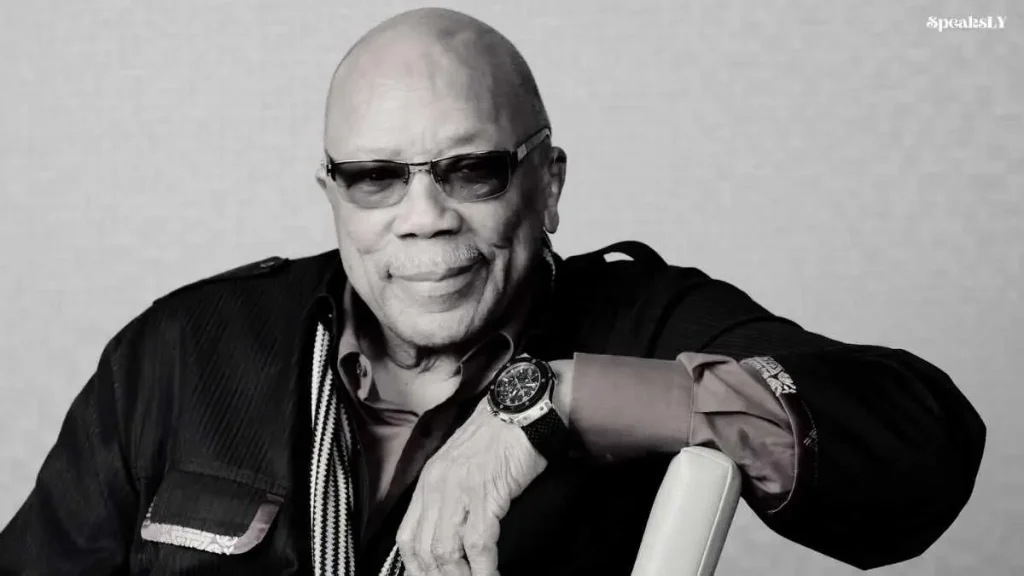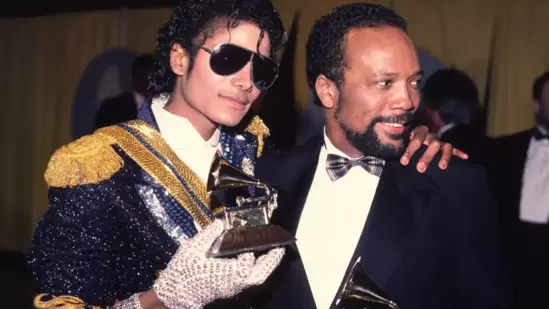
The night Quincy Jones passed away, the lights of Bel Air seemed dimmer, as if the city itself mourned. In a room filled with family, the man who had woven together the fabric of American pop culture took his final breath, leaving behind a legacy that was larger than life.

Quincy Jones
Quincy had been born in 1933 in Chicago, where music first touched him through the walls of his childhood home, notes from a neighbor’s piano drifting through thin walls. By age seven, he was hooked. His journey into music began with piano lessons and his mother’s singing. After his parents divorced, he moved to Washington with his father, discovering brass instruments in high school and playing in jazz bands by the time he was a teenager. It was in Seattle clubs, at just 14, that he first shared a stage with a young Ray Charles. Years later, he’d call that moment a taste of destiny.
New York came next, where Quincy’s trumpet played beside legends. He worked with Elvis Presley, Charlie Parker, and Miles Davis, mingling with the icons of the bebop era. He toured Europe with Lionel Hampton, studying in Paris and crossing paths with Pablo Picasso, Josephine Baker, and James Baldwin. The world was a classroom, but it was music that taught him most. In Paris, as Dizzy Gillespie’s musical director, Quincy led a crack band across South America and the Middle East. He saw the world through jazz, but by 1957, he found himself in crippling debt. With only his passion to keep him going, he took a job with Mercury Records, starting his climb up the ladder of pop culture.
The hits soon followed. Quincy arranged and produced for Ella Fitzgerald, Dinah Washington, and Sarah Vaughan, then Sinatra and Aretha Franklin. He was behind the scenes for classic films like The Italian Job and The Color Purple, where he made history as the first Black American nominated for best original song at the Oscars. He scored television shows, produced for stars, and recorded albums under his own name, constantly pushing boundaries. He believed music was a universal language, bridging jazz, R&B, and pop. “When people write about music, jazz is in this box, R&B is in this box, pop is in this box,” he once said, “but we did everything.”
Then came Michael Jackson. Quincy was the mastermind behind Off the Wall, Thriller, and Bad, albums that cemented Jackson’s place as the King of Pop and changed music history. When they produced We Are the World for Ethiopian famine relief, they made magic—and raised millions. Quincy called Jackson his “little brother,” and when the singer passed away, a part of him felt lost.
Quincy’s genius stretched beyond music. He produced The Fresh Prince of Bel-Air, the sitcom that launched Will Smith’s career. His company, Qwest TV, an on-demand music service, launched when Quincy was in his 80s. Even then, he was still innovating, his passion unshaken by time.
Quincy had been married three times, first to his high school sweetheart Jeri Caldwell, then to Swedish model Ulla Andersson, and later to Mod Squad star Peggy Lipton, with whom he had two daughters, including the actor Rashida Jones. He raised seven children, loved deeply, and lived boldly. His life was studded with close calls, including a narrow escape from the Charles Manson cult, and a brain aneurysm that nearly killed him in 1974. Yet, Quincy survived it all, living unapologetically and mentoring countless young artists, like Grammy-winner Jacob Collier.
On his final night, Quincy Jones left this world with his family by his side. He departed the way he had lived: surrounded by love, his legacy etched into the music, films, and lives he touched. His family’s statement rang true—though his passing was a loss, they would celebrate the great life he’d lived, knowing that there would never be another like him.





